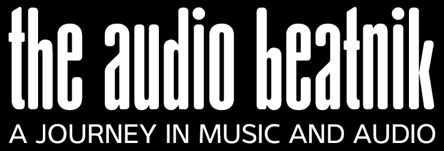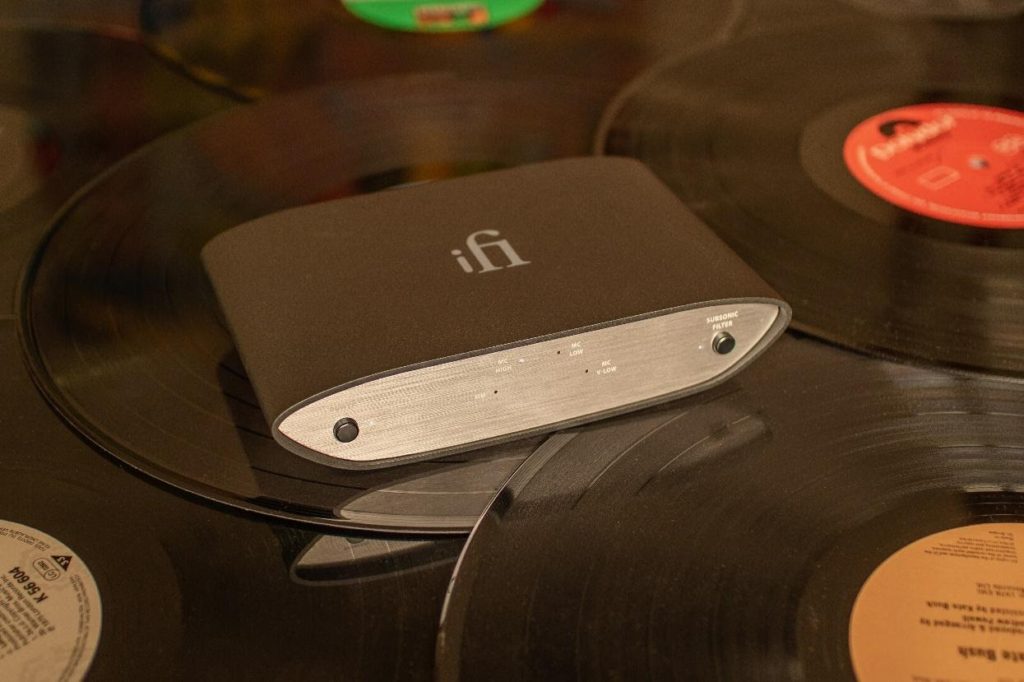
The ever-increasing price of high-end audio equipment is a common complaint I get from readers time and time again, but there is such a thing as affordable audio. Admittedly, however, the trend in our industry of offering components for five and six figures has grown. I can see why readers get the impression that you need to be a lottery winner to afford good sound.
While I do understand that readers can feel this way, there is another trend of affordable audio that I have noticed over the last five years or so that I think counters this thinking. I’ve been in the audio industry for 40 plus years, and I cannot remember another time when you could get so much sound for your audio dollar as you can right now. I’m referring to high-value products from companies like Elac, Schiit Audio, Orchard Audio, Dali, NAD, Rega. The list goes on and on. If you are an audio lover, these high-value products enable you to assemble a particularly good-sounding system at a reasonable price.
ifi Audio and High Value
iFi Audio is now on my list of companies with affordable audio products that sound good. Born in England in 2012, iFi is the sister brand of Abbingdon Music Research (AMR) based in Southport, UK. iFi was originally conceived to deliver portable and desktop audio products intended to address the growing trend of computer-based audio. Since then, iFi has expanded and offers home audio components. In fact, their new DAC has gotten some favorable press recently, and you may have seen these reviews of other iFi products on our website recently:
However, iFi really piqued my interest when they released their latest offering to the vinyl community, the ZEN Phono stage. I was even more intrigued when I learned that John Curl was a consultant on the design and worked with the iFi technical team headed by Thorsten Loesch. This team produced this affordable, fully balanced, and ultra-low noise phono stage that sells for a mere $150. Yes, you read that right, $150. That’s affordable audio! I have a pair of RCA jacks that cost more than that!
ZEN Phono Stage Details
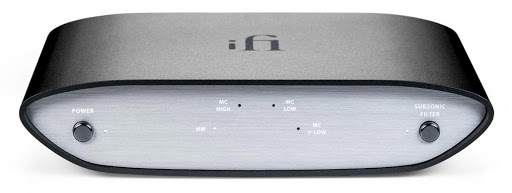
The phono stage’s diminutive 6.3”x 4.4”x 1.4” stylized package has a very solid feel to it. An industrial design, it features a dark blue anodized metal case with a clean aluminum faceplate. The faceplate sports metal power and subsonic filter buttons. Four discrete LEDs round out the front panel and indicate the gain mode that is selected. The choices are MM, MC HIGH, MC LOW, or MC V LOW.
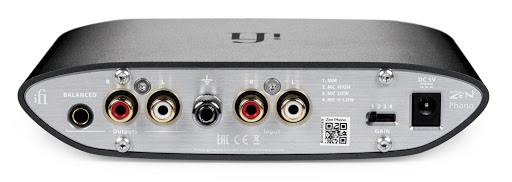
Moving around to the rear of the unit you’ll see RCA input and output jacks. There is also a ground lug that accepts a banana connection, a 4-position gain switch, and a 5V DC power supply input jack. Additionally, it has a 4.4mm balanced output. Now that’s something you don’t often see.
Technically Speaking
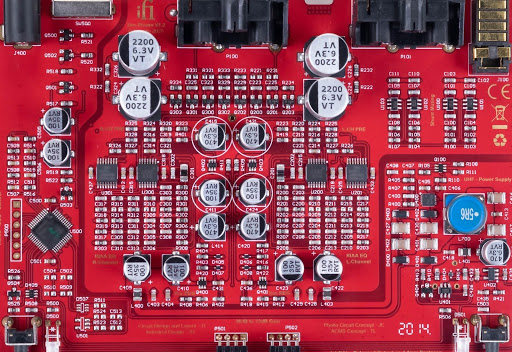
The amount of information I found when I researched this component surprised me. I cannot remember the last time so much technical information was available on a component at ANY price, much less one that only costs $150.
Suffice it to say that this phono stage is a balanced symmetrical dual-mono design. You normally don’t find this design in the more affordable audio products. It uses high-quality parts like TKD COG ceramic capacitors, Panasonic ECPU capacitors, and custom OV Series Op Amps throughout with a focus on a low noise floor and low distortion. The gain range is 36dB to 72dB. Other notable highlights are that this unit features an RIAA accuracy of ±0.15dB and a noise floor of -151dBv!
One concession to cost is that there is no separate cartridge loading adjustment. Each gain setting has a fixed loading value. The fixed values are MM @ 47kOhms, MC High @ 47kOhms, MC Low @ 1kOhms, and MC V Low @ 110ohms. Realistically, these intelligent choices should work well with most cartridges.
Subsonic Filter
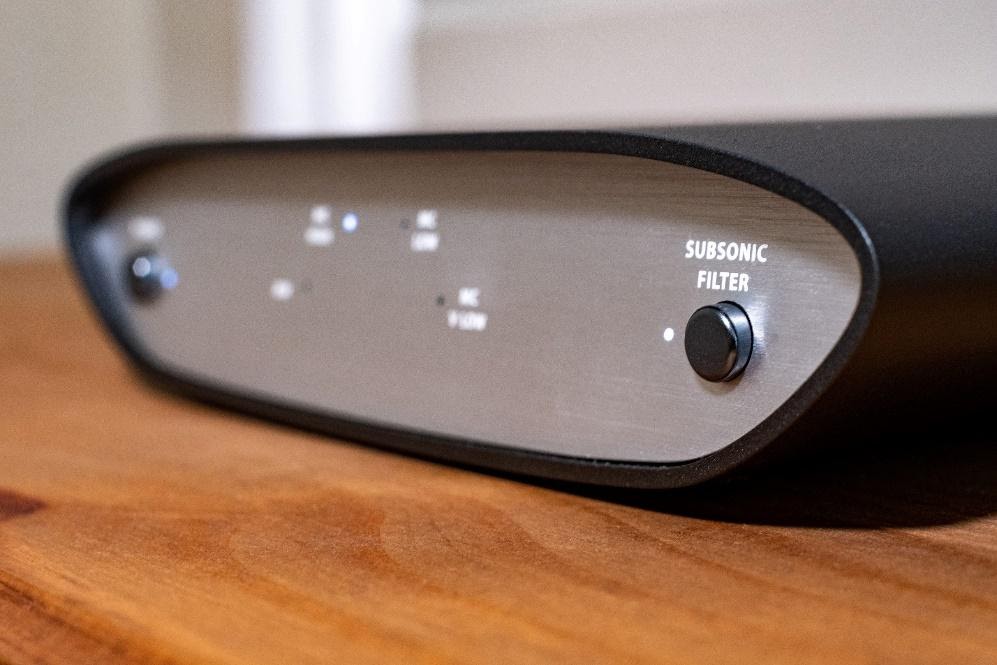
There is a unique Subsonic Filter that you can engage from a button on the front panel. I will let iFi Audio explain its unique design:
“This propriety circuit intelligently filters out the unwanted subsonic output without affecting any deep bass on the recording—an undesirable side effect of some warp filters. This is how it works.
Vinyl cutting lathes incorporate a so-called ‘elliptical filter’ which means that low-level base on an LP is invariably mono and creates only horizontal movement of the stylus therefore any low-frequency vertical movement of the stylus as it tracks the LP can only be the result of record warp. ifi’s subsonic filter removes the effect of record warp from the vertical plane doing its job efficiently without the common drawbacks of attenuating any lobes or adding group delay.”
Here is a link to a comprehensive technical explanation of the ZEN Phono design for those of you who would like to explore this design further.
Note: During my audition period, the subsonic filter performed as advertised. On one album where I could see my woofers responding to a slight warp in the album, I engaged the filter, and the woofers stopped their random dancing. I replayed the song and I did not sense any difference in the music. Very nice.
Listening Notes – System Two
I used my System Two to review this phono stage. This system consists of my trusty Kyocera PL 701 turntable with a Denon 103R and a Rogue Audio Tempest II Magnum Integrated amplifier powering Rosinante’ Evolution Signature speakers. The phono stage is a modified Jolida JD 9, a tube phono stage. It is actually an op amp-based circuit with a tube-buffered output. I inserted the Zen Phono in place of the Jolida and set the gain to MC V Low with a Denon 103R friendly 110 ohm load.
Harry Nilsson’s A Little Touch of Schmilsson in the Night
First up was the Audio Fidelity pressing of Harry Nilsson’s A Little Touch of Schmilsson in the Night. The dead quiet noise floor of the ZEN Phono was immediately apparent. It allowed the subtleties of Nilsson’s voice to come through. On “Makin’ Whoopee!” the orchestra was spread out over the soundstage, and the strings, which can bite now and then on some systems, were never offensive.
There was an overall sense of calmness that I noticed on the Nilsson album and a number of albums that I played using the ZEN Phono. This was probably due to the low noise floor. Also, the ZEN Phono can carry a tune, and It was very easy to connect with the music.
Dead Can Dance’s Into the Labyrinth
Next up, I played the Mobile Fidelity reissue of Dead Can Dance’s Into the Labyrinth. The ZEN Phono performed admirably and revealed the size of the soundstage and the scale of the recording. Its sins were those of omission in terms of extended openness and transparency on the top end. The midrange was a bit less focused but quite open and still very pleasing. The music came from a very black background. The bass was beyond my expectations for a phono stage at this price. I heard bass that was deep and extended with very good control and attack.
Lou Reed’s Transformer
I followed Into the Labyrinth with the Classic Records reissue of Lou Reed’s Transformer. On the “Walk on the Wildside” cut, this little “budget” phono stage got to strut its stuff. It rendered Lou Reed’s voice very well and captured the sense of space in the recording.
The delicate guitar work in the right channel at the beginning of the song was also nicely captured. The backup singers were three feet outside of the speakers and the saxophone’s decay at the end of the cut was very apparent. The saxophone itself was quite smooth with good tonal density.
Listening Notes – System One
Emboldened by the sound I was hearing on System Two, I decided to move the ZEN Phono Stage over to System One. I replaced the Parasound JC3+ that was being fed by a Micro Benz LP-MR in System One and dropped the ZEN Phono Stage into its place. I set the gain switch to MC Low with 1K loading.
Using a $5K cartridge with a $150.00 phono stage is not a typical real-world combination, but I wanted to see if the ZEN Phono Stage had the chops to hang with the Benz. While it yielded to the JC3+ in the areas of soundstage height and depth, microdynamics, and overall transparency, the little ZEN Phono Stage was not embarrassed to hang out with the cool kids. While the JC3+ had cooler clothes and a fancier car, the Little ZEN had some street smarts. The ZEN Phono Stage remained in my main system for a full week and kept me engaged with the music.
Available Upgrades for the ifi ZEN Phono Stage
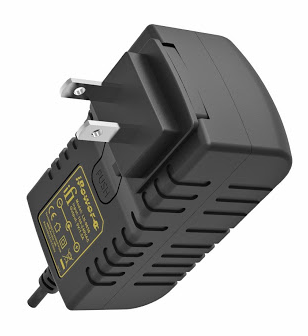
ifi Power Supply
My background in component modification always has me wondering about upgrades. I inquired about an upgrade to the stock wall-wart power supply that comes with the ZEN Phono Stage. The technical staff at iFi advised me to get the middle-of-the-line iPower power supply. They said it would be the better upgrade for the ZEN Phono Stage rather than their more expensive iPowerX, although they never explained their reasoning to me.
About a week later, the iPower power supply arrived, and I plugged it into the ZEN Phono Stage. It did indeed “kick it up a notch”. With the upgraded power supply, the bass’ foundation was more firm, and overall the sound felt more solid, better anchored, and larger in scale. This is a worthwhile $50.00 upgrade if there ever was one.
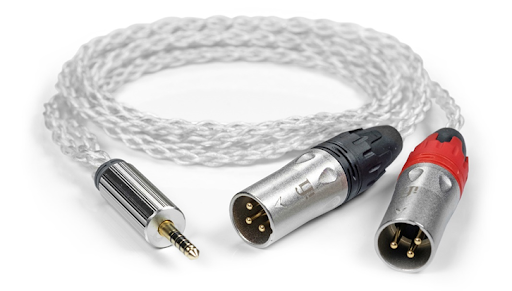
ifi Balanced Cables
I mentioned earlier that the ZEN Phono Stage has a 4.4mm balanced-out connector. Late in my review period, the iFi balanced cable became available, but I did not have time to fully explore it. Their new balanced cable uses silver-plated OFC copper in a braided custom helix design said to minimize capacitance and inductance and reduce RFI and EMI noise. iFi offers it at $99.
I found that the balance connection raised my level of engagement with the ZEN Phono Stage. Instruments resided in their own space and the already low noise floor was further reduced. Admittedly, this could be the result of several factors, not the least of which could be the cable itself or simply moving to the balanced input on my preamp. Since I did not have an equivalent RCA cable I could not explore this. Suffice it to say in my situation the balanced configuration was an upgrade.
An Industry Disruptive Product
The ifi ZEN Phono Stage is affordable audio, but it’s also what I call an industry disruptive product. By that I mean it resets the paradigm for the expectations of performance at this price point and a good bit above. I was not expecting to hear the sound that this budget wonder produced.
As I am typing this, System One with the ZEN Phono Stage is playing in the background. My foot is tapping, and I feel the need to get up and go listen to it. In the end, I preferred the ZEN Phono Stage to my modified Jolida JD-9. The ZEN Phono Stage’s ultra-low noise floor, neutral tonal balance, and bass reproduction won the day over the Jolida’s more editorialized presentation. The ZEN Phono Stage will find a permanent home in my System Two.
An Easy Recommendation
My experience with solid-state sub $300 phono stages over the years have been pretty consistent. Typically, they have been on the thin-sounding side and tended to “shout” at you as the volume increased. They also tended to constrict the soundstage and dynamics. Emotional involvement was missing. That is not the case with the ZEN Phono Stage.
The ZEN Phono Stage throws a relaxed, large soundstage with low-end weight and an open midrange from a dead quiet background. It simply belies its price. Most importantly, it engages you. Album after album revealed sound I would associate with products considerably above the price point of the ZEN Phono Stage.
In fact, I would confidently bet a paycheck that, if you placed the ZEN Phono Stage behind a curtain, 10 out of 10 people would overestimate its price. I would further bet that the majority would guess that the price is well over $500. Yes, the little tike has impressed me if for no other reason than it opens up an avenue for music lovers on a budget to pursue a better vinyl experience.
I will leave you with this thought. If you dismiss auditioning the ZEN Phono Stage based on its $150 price tag, you are doing yourself a disservice. It is an easy recommendation. Now, you will have to excuse me. I need to go sell a pair of RCA connectors to pay for it!
Prices:
ZEN Phono Stage $150
Power Supply (upgrade) $50
Balanced Cables $99
Click here to view specifications for the ZEN Phono Stage.
